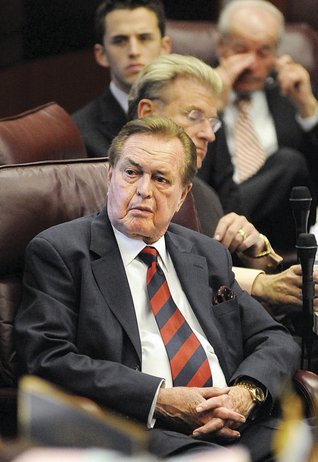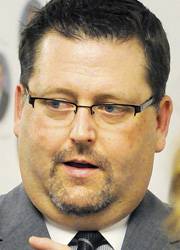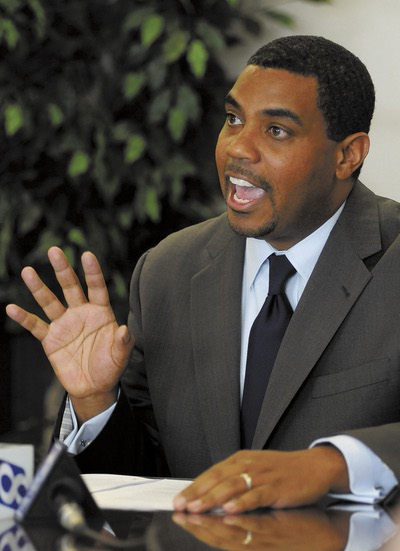
KEVIN CLIFFORD/ SPECIAL TO THE SUN
Senate Minority Leader Bill Raggio, R-Reno, told legislators Wednesday he would abstain from voting on the budget despite his belief he would use independent judgment. A law partner of Raggio’s had lobbied for increased taxes.
Thursday, May 21, 2009 | 2 a.m.

Sen. Warren Hardy, R-Las Vegas, is president of the Associated Builders and Contractors, whose board includes the president of the Las Vegas Chamber of Commerce, which is lobbying to curtail public employee pay and benefits.
Sun Archives
- Time not on state budget's side (5-20-2009)
- Horsford maneuvering now, planning ahead (5-19-2009)
- Legislative process no match for lawmaker gamesmanship (5-19-2009)
- Talks on taxes collapse, to resume Tuesday morning (5-18-2009)
- Gibbons signs marriage license bill despite tax opposition (5-18-2009)
- Why winning Legislature got Democrats only so far (5-17-2009)
- Party in power's tension heating up (5-13-2009)
- As budget clock ticks, easy part still isn't done (5-12-2009)
Sun Coverage
Sun Blogs
It is not surprising that alleged conflicts of interest caused something of a meltdown at the Legislature here Wednesday.
This Legislature, like so many Nevada legislatures before it, is rife with conflicts of interest, owing to being a citizen legislature wherein lawmakers make almost no money and must support themselves with day jobs.
And now, potential conflicts of interest have made the hunt for a final budget deal look more precarious as lawmakers close in on a deadline. Legislators must craft a package of tax increases and spending cuts to close the state’s nearly $3 billion budget hole.
Anti-tax forces, including Republican consultant Robert Uithoven, are using potential conflicts as a way to peal off yes votes.
The state Senate needs 14 votes, including at least two from Republicans, to override an expected veto from Gov. Jim Gibbons. Now one Republican who was thought to be in the yes column has said he must abstain because of conflicts of interest. Another is back in the vote for the tax plan after the state Senate changed rules late Wednesday governing conflicts of interest and abstentions.
State Sen. Warren Hardy, R-Las Vegas, stepped away from his role as lead negotiator for his party on changes Republicans want to pay and benefits for public employees. Hardy took the action after he claimed he learned of a threatened ethics complaint against him for conflict of interest. He said he will also abstain from voting on the budget.
The conflict: He is president of the Associated Builders and Contractors, whose board includes the president of the Las Vegas Chamber of Commerce, Steve Hill. The chamber is lobbying hard to curtail public employee pay and benefits.
A few hours later, in a dramatic turn, Minority Leader Bill Raggio, R-Reno, one of the lions of the Senate, made a lengthy and impassioned speech in which he decried attacks on legislators’ ethics after he was also threatened with an ethics complaint if he votes on the tax bill that is a necessary element of the Legislature’s attempt to balance the budget.
Raggio is a partner in the law firm Jones Vargas, a powerful lobbying firm here.
Raggio initially had said he could exercise independent judgment but would abstain, on advice of counsel, because his law partner had lobbied in favor of the tax plan. An exemption passed Wednesday night says conflict rules remain in place but don't require senators to abstain from voting on measures "of immense statewide importance which globally impact all citizens of this state." A ban on voting should occur "only in clear cases" of conflict, the revision states.
The stunning events came at an unfortunate time.
The Legislature’s 120-day session ends June 1. Gov. Jim Gibbons will likely veto any tax increase and he can delay acting for five days after the Legislature sends him a final budget.
Counting backward, legislators think they need to have a deal by today or Friday if they are to give Gibbons time to act and the Legislature time to override any veto by June 1.
If the clock runs out, the Legislature can act on a veto only if Gibbons first calls them into special session, a step lawmakers think is unlikely if it means his veto will be reversed.
Hardy has been replaced as chief Republican negotiator by state Sen. Randolph Townsend, R-Reno, who said several Republican votes remain for the tax plan.
Wednesday’s chaos highlighted some of the unavoidable dysfunction of a citizen legislature. Avoiding all conflicts is nearly impossible, yet failure to avoid them creates distrust in a public that suspects lawmakers of enriching themselves, political scientists say.
Faced with these conflicts, legislators have thrown up their hands, with an expected bicameral resolution in the works that would essentially say, “Because we all have conflicts, none of us has conflicts,” not unlike Catholic original sin and absolution.
Senate Majority Leader Steven Horsford, D-Las Vegas, said he would do everything in his power and within Senate rules to allow all members to do their constitutional duty and vote on a budget that funds essential services and is in balance.
Assembly Speaker Barbara Buckley was more specific: Asked earlier Wednesday whether she thought Raggio would be allowed to vote on a tax package, she said: “Yes. The resolution was drafted hours ago.”
It’s still not clear if Hardy will vote.
Hardy faces an unresolved ethics complaint for allegedly mixing his roles as senator and lobbyist during the 2007 legislative session.
Hardy says he could be accused of carrying water for the chamber because its president, Hill, has a supervisory role over Hardy on the builders and contractors board.
Hardy said he did not want to put his family through more ugly headlines.
He said he asked for a legal opinion from legislative counsel that would give him a green light. Counsel told him his conduct is defensible, but could provide no letter.
Raggio had made his stand on the floor of the Senate, explaining his decision to abstain but defending the idea of the citizen legislature.
“Maybe we ought to sit back and review these a little and decide whether or not we want ordinary people who have some interest of being in the Legislature ... who are trying to do their duty and doing it sincerely, and let’s make sure they don’t feel threatened every time,” he said. “I’m getting a little irritated with this kind of activity.”
Although Raggio and Hardy have often disclosed conflicts and abstained on occasion, some of their colleagues have been spotted in significant conflicts this session:
• Assemblyman Morse Arberry, D-Las Vegas, chairman of the powerful Ways and Means Committee, introduced Assembly Bill 452 in March. The measure, which died, would have extended the time before a foreclosed property could be seized, even as Arberry faces foreclosure on two of his rental properties.
• Assemblyman Mark Manendo, D-Las Vegas, offered Assembly Bill 297, which would prevent insurance companies from opening autobody shops. Manendo is head of marketing and public relations for a body shop and would face new competition from the planned Sterling Autobody, which is less than a half-mile from Manendo’s Collision Authority in Henderson.
• State Sen. Mike Schneider, D-Las Vegas, introduced Senate Bill 115 to bring light rail to Southern Nevada, and the line would have gone near a five-acre parcel he owns.
• Just before the session began, state Sen. Mark Amodei, R-Carson City, resigned as president of the Nevada Mining Association, which is a significant force in the capital.
Other conflicts seem more benign.
For instance, AFL-CIO head Danny Thompson sits on the board of the nonprofit Nevada Partners, of which Majority Leader Horsford is the CEO. Thompson has been a vocal opponent of reductions in public employee pay and benefits like those being advocated by the Las Vegas Chamber.
Also on the Nevada Partners board is Tony Sanchez, senior vice president of NV Energy, which has important legislation before lawmakers. D. Taylor, secretary-treasurer of the massive hotel workers union, Culinary Local 226, sits on the board, too, as does MGM Mirage board member and energy lobbyist Rose McKinney-James.
Horsford is also CEO of the Culinary Training Academy, which features an influential board as well.
The process for policing conflicts has collapsed.
The Supreme Court recently heard the ethics complaint against Hardy after a lower court ruled in Hardy’s favor. That court said the state Ethics Commission, which has long been viewed as a weak institution often used for political payback, cannot regulate the Legislature because to do so would violate the separation of powers between the branches of government.
That leaves the Legislature to regulate itself.
It’s not just the citizen legislature that causes these dilemmas. It’s also how the state has developed. Despite decades of rapid growth, Nevada has a political and economic elite that still adds up to a small group of deeply intertwined tribes.
Thus, conflicts are inevitable.
A Nevada political scientist was sheepish.
“What are you going to do?” asked UNLV political scientist Dave Damore. “It’s a small political culture, and an unprofessional one, with two industries,” he said, referring to gaming and mining.
Damore said a professional legislature is not the answer, noting the dysfunction in such places as California and New York, which have full-time legislatures.
As for a broader conversation about political ethics in Nevada, Damore has doubts: “Until the voters make noise, you’re not getting serious about ethics here. It’s just not going to happen,” he said.
Sun reporter David McGrath Schwartz contributed to this report.


Join the Discussion:
Check this out for a full explanation of our conversion to the LiveFyre commenting system and instructions on how to sign up for an account.
Full comments policy